Austin Bat Removal
Welcome to Austin Bat Removal! We are Texas bat removal specialists. It is important to know that bats are protected by Texas law, and are beneficial animals to have in the environment. We do not kill any bats during our bat removal process. Never hire a pest control company or anyone who says they are a Austin bat exterminator. For correct and effective bat removal, you want a company that specializes in humane bat colony extraction. Our process is not only the only legal method in Texas, but it is the most effective. We have a 100% success rate in our bat control process. We perform our industry-best 32-point inspection of your house or building, and seal shut all bat entry holes down to 1/4 inch as part of the removal process, during which we remove the colony via special one-way exclusion devices specific to your architecture. Once all bats are safely out, we permanenetly bat-proof the structure. We also provide guano (bat droppings) removal and decon. Click on our Austin Bat Control Prices page to find out more about our prices for bat control work. We work 24/7/365, and would love to talk to you about your bat problem. Call us any time at 512-453-7096 to discuss it, discuss our pricing, and if you wish, set up an appointment at your convenience, often same-day.
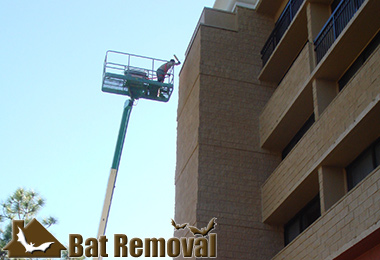
Austin Building and Attic Inspections
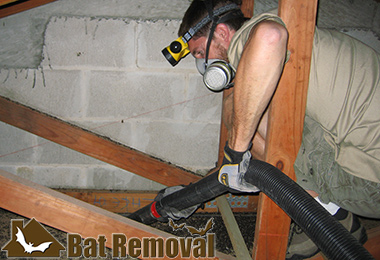
No-kill Texas Bat Extraction
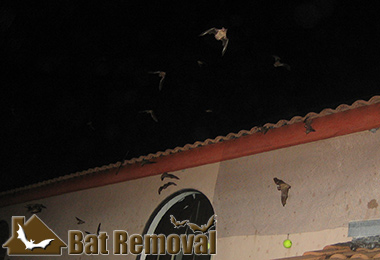
Guano Cleanouts - Serving all of Texas
Call 24/7 to discuss your bat problem.
Same-day or next-day appointments.
32-point inspection of your property.
Written estimates for bat removal project.
Fully state licensed and insured.
Residential and commercial service
100% no-kill Austin bat extraction
Complete bat-proofing of your building
Compliance with all Texas, federal laws
Guano removal and attic decontamination
Our Service Range - 512-453-7096
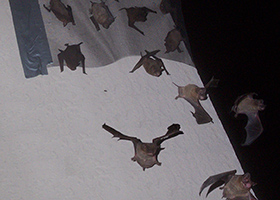
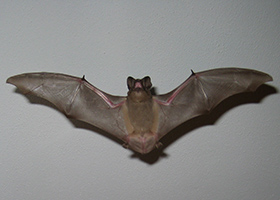
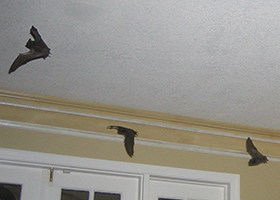
When Do Bats Leave Their Roost
We have a lot of misconceptions towards bats. Thanks to how they have been depicted on movies and books, bats are one of the most misunderstood creatures. Bats deliver a range of benefits to mankind. They can help spreading seeds to different location and their bat guano ensures that the seed will have enough nutrients to grow. Some of them are pollinators and can control the population of insects.
Time That Bats Leave the Roost
In the US, there are more than 40 species of bats. The time that they will leave their nest and how long they will remain outside will vary depending on the bat species. For instance, some bats will leave 15 minutes after the sunset while others will leave while there is still light.
Most Bats Are Nocturnal Creatures
The bats are usually active at night. As the sky goes dark, the level of their activity will increase. They will start to emerge from their roosting sites and start hunting their foods. Bats have a voracious appetite since they will have to build up their body fat in preparation for the winter. The feeding of the bats will last for at least 1-2 hours. They will then rest for a couple of hours before they begin hunting again before sunset.
The Time They Return to Their Roost
The time that the bats will return to their roost will vary depending on the species. Usually, you will catch them leaving their nest at sunset. They will then be returning to their caves at the early morning. The bats will usually spend daytime resting inside their cave. They can also be socializing with each other or grooming. In the urban communities, the potential roost of the bats will be in the human structures.
Bats Are Not All Nocturnal
While majority of the bats are nocturnal that hunts in the dark, there are also species of bats that will remain active at daytime. Different species of the bats can sufficiently handle varying level of lights. However, there is a particular study that discovered that the presence of lights can significantly reduce the presence of the bats. All in all, bats prefer to move in the dark to avoid their predators. However, you should not be surprised when you notice some bats leaving their roost during daytime.
While the bats are known to be essential for the health of the environment, you still don't want to discover them inside your home. Bats can harbor a range of ectoparasites and may be infected with disease that is transmissible to humans. You should have a preventative measure in place to keep your house protected against their threat. Once the bat decided to establish their roosting site in your house, expect that they will keep on returning. Furthermore, they are protected species under the federal law that makes it complex to exclude and remove them. Sealing all the entry holes that are a half inch and above can help you keep a bat-free house.

